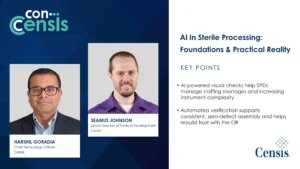How Does the Weight of New Responsibilities on Nurses Impact Care?
The challenges healthcare executives and administrators face are constantly changing. Host Kevin Stevenson talks with the heroes behind the heroes that are enabling hospitals, urgent care centers and telemedicine operators to spend their time tending to patients, while they handle the logistics.
Nurses are an integral part of the healthcare ecosystem. They have been critical to the frontline response to the pandemic, but how is the profession faring? Host Kevin Stevenson invited Kathleen O’Grady Winston, Ph.D., RN, College of Nursing Dean at the University of Phoenix, to the show to discuss what’s happening in nursing, including a new survey her college published.
The first topic Stevenson addressed was the concern of an exodus from the profession because of the stress of COVID-19. Winston shared, “There is good news on this, as 99% of respondents to our study said they are still very satisfied with the profession.”
Winston does, however, have concerns with the pipeline of qualified, eligible candidates. “We have a capacity and pipeline issues exaggerated by the pandemic but existed before,” she said.
While interest in the profession is high, Winston noted that the desire to be a nurse and what’s needed academically and personally are different things.
The curriculum for nursing is also always evolving, and COVID-19 has made its impact. “It’s a dynamic discipline, and we’ve been updating activities and experiences that prepare for the management of infectious diseases,” Winston noted.
Stevenson and Winston then went in-depth on the survey results, picking on two data points that are important to address—nurses not being heard or appreciated. How do these sentiments impact the industry?
“What they are asking for is to be at the table when decisions are made. They have a unique voice, and it’s one of advocacy for the patient. For nurses to be appreciated, transparency, sharing information, and closing the loop by communicating back to the nurses on the insight they provided,” Winston said.










